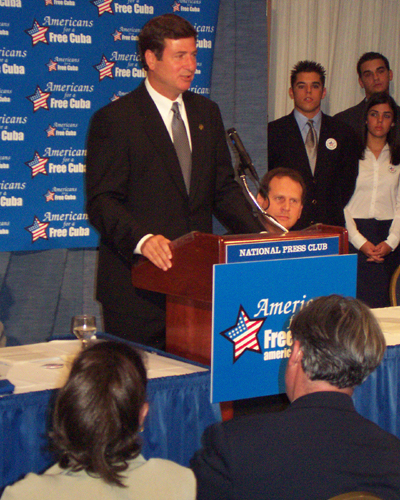 |
|
For Release: Tuesday, September 17, 2002 Allen Counsels Against Easing Embargo on Castro's Cuba
In remarks to the group "Americans for a Free Cuba," Senator Allen said that history has shown that trade with Cuba helps the Castro regime but has not improved the plight of the Cuban people. "There are those who are saying that we ought to change our trade policies with Cuba," Senator Allen said. "Cuba is a bankrupt nation. They have been defaulting on debts and credits to nations such as France, Argentina, many European countries, Asian countries, and Latin American countries. "There are those who blame the United States for the deplorable conditions in Cuba. The blame lies squarely on the repressive shoulders of Fidel Castro. Indeed, for many years other countries have been trading with Cuba, whether from Latin America, Europe or elsewhere, and what effect has that had? None." Senator Allen said that Cuba presents a credit risk for nations that trade with it. "At a pivotal point in the history of Cuba, when more and more countries are saying, 'Forget it, Castro doesn't pay his debts, he doesn't conclude credit operations properly,' why should the United States come in and bail him out? Trading with Fidel Castro will not help the people of Cuba; it's evidenced by other democracies that have traded with him. "What we need to do is stand with those who are freedom fighters, with those hundreds if not thousands who are politically repressed in prison in Cuba. You can count on me not to stand with those who would, in effect, prolong the twilight of this repressive Castro regime." Senator Allen in May 2002 joined the Congressional Cuban Political
Prisoner Initiative, in which he sponsored a Cuban political prisoner
named Francisco Chaviano Gonzales to advocate on his behalf and that of
other political prisoners. He also recently joined his colleagues from the
Initiative in urging the United Nations High Commissioner for Human Rights
to engage the Cuban government on human rights issues. ### |
 WASHINGTON, DC - U.S. Senator George Allen (R-Va.)
today urged against easing American trade restrictions on Cuba before
dramatic reform and respect for human rights occur on that island
nation.
WASHINGTON, DC - U.S. Senator George Allen (R-Va.)
today urged against easing American trade restrictions on Cuba before
dramatic reform and respect for human rights occur on that island
nation.